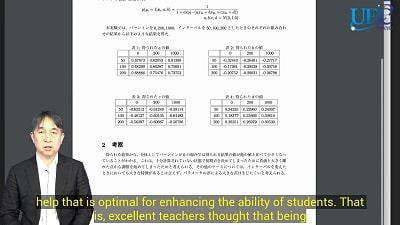March 2019 Issue
Researcher Video Profiles
Maomi Ueno, Professor at the Graduate School of Informatics and Engineering
Adaptive learning system using big data based machine learning

Maomi Ueno is conducting research on machine learning, artificial intelligence, big data analysis, centering on Bayesian statistics. I this video he describes his group's research on education system with artificial intelligence using machine learning. The system adaptively supports the system according to the student's abilities and is called adaptive learning.
Recently, tablet PCs have been introduced in schools in vast quantities and are spreading explosively. Conventional adaptive learning of artificial intelligence estimates where students stall and teaches them carefully from there. However, many educational experts say, "students should not be taught too much or too little about the difficult parts of education. Let students think for themselves and give adaptive and minimum support as possible for education to be effective". So, what is the best support? That is the main question in this study.
Ueno thought that when students were solving problems, whether it would be actually possible to give the minimum level of support. And, excellent teachers were predicting the probability that students can achieve their task with their support. In addition, he hypothesized that there might be the probability of giving a correct answer that is optimal for enhancing the ability of students. That is, excellent teachers thought that being able to predict the performance of learners before supporting them was an important requirement.
This is a very difficult task, but in fact, machine learning in artificial intelligence is good at predicting the performance from students based on their previous performance at learning new tasks. Therefore, Ueno proposed a framework that selects and presents support/hints so that the probability for a correct answer becomes 0.5 using machine learning to analyze the past learning history of students, before supporting students.
Specifically, Ueno and his colleagues have developed an adaptive learning system that evaluates the ability of students based on tasks to write computer programs. When students make a mistake, the system gives hints to so that the probability of students giving the correct answer to a problem is 0.5.
First, after a lesson on programming with a simple example of a program, we conducted a post test on students by implementing the conventional system and the new proposed method with various prediction probabilities and compared the learning effects. As a result, they found that it is effective for learning to assign a hint so that the probability of correct answer is 0.5 just by setting a slightly difficult task it at first. Surprisingly, it turned out that teaching methods that teach everything from scratch as in the past had the least learning effect and the students were only able to do the tasks that were taught. They cannot solve questions that were slightly different from the initial task.
In the system that gives hints so that the correct answer probability becomes 0.5, as the student's ability increases in the learning process, Ueno found that the amount of support necessary gradually decreases, that is, the number of hints decreases gradually, and even if assistance was necessary initially, the students gradually become independent.
Ueno found that this process is the most effective learning process. Currently, we are developing new systems for mathematics and other subjects such as English. "In addition, although I am using a mathematical model that can be applied only to closed problems, I would like to develop a mathematical model that can be applied to open problems such as writing essays and other needs of evaluators."
Further information
Maomi Ueno
Professor at the Graduate School of Informatics and Engineering, The University of Electro-Communications.
Research Highlight: Adaptive learning system using big data based machine learning


